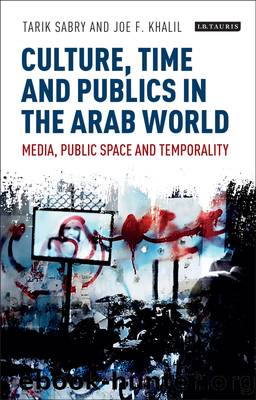Culture, Time and Publics in the Arab World by Tarik Sabry Joe F. Khalil

Author:Tarik Sabry, Joe F. Khalil [Tarik Sabry, Joe F. Khalil]
Language: eng
Format: epub
ISBN: 9781788311922
Barnesnoble:
Publisher: Bloomsbury Academic
Published: 2019-05-30T00:00:00+00:00
Figure 4.2 Café Rawda on a Ramadan evening during the airing of Bab al-Hara in 2010.
As with the alcohol ban, the presence of the television screens in Rawda slightly changed, but did not alter, the place. Rawda remained inclusive of people from different sectarian, class and ideological backgrounds. It is not only the spatial that is socially constructed but also the social that is spatially constituted within spatial forms and relative social locations (Massey 1992: 80). Rawdaâs history as a shaÊ¿bi seaside cafe hindered its shift to an enclosure for âconservativeâ clients that were identified by Muhammad Shatila. The continued presence, or return, of some of the ânon-conservativeâ crowd, although they were annoyed by the alcohol ban, guaranteed that Rawda remained a meeting point, whose meaning is neither fixed nor static, but open to contestation. This contestation over place reflects a contestation over values that can also be traced in the debate among Rawdaâs clients attending viewings of Bab al-Hara. In the next section, I introduce two of them and question whether neo-tradition as a descriptive category, used to describe the cafe, can provide an analytical framework to examine the representations of the past observed in a place.
Negotiated public
I met Adam and Shaker (both born in 1990) in Café Rawda. They were sitting in a group to play card games requiring a minimum of four players. Adam and Shaker were very good friends, studying at the same private university. Adam worked for his family business, a food processing industry, while studying for his bachelorâs degree in business administration. Shaker worked full-time at a bank in parallel to studying for his bachelorâs degree in finance. Both young men took their work engagement seriously as they woke up at 6 am during the week to be at work before going to their classes in the afternoon. Adamâs leisure lifestyle, however, differed from that of his friend Shaker, who partied more frequently and occasionally spent time with his parents. Adam, on the other hand, hardly went out clubbing and spent most of his free time with his family. The young men described their position in relation to regional politics and global economics. They repeatedly spoke about their need to secure themselves and to be able to start a family, and, more generally, the impossibility of making a decent living in Lebanon. While they agreed about economics, a conflict arose about politics. Shaker was critical of an Arab nationalist rhetoric, abided more closely to a liberal worldview, and reiterated the political cynicism he described his father to have had, while Adam supported Arab nationalist sentiments and used quotes by Jamal Abdel Nasser. The differences in values and attitudes between the two friends reveals the complexity of Rawdaâs public, which is termed âconservativeâ.
In one encounter, Shaker revealed sensitive details about his first romantic relationship, which was beginning to become serious. Nine months into the relationship, the ex-girlfriend confided to Shaker that, before she met him, she had had an extra-marital sexual experience and that she was not a virgin.
Download
This site does not store any files on its server. We only index and link to content provided by other sites. Please contact the content providers to delete copyright contents if any and email us, we'll remove relevant links or contents immediately.
Nudge - Improving Decisions about Health, Wealth, and Happiness by Thaler Sunstein(7694)
The Fire Next Time by James Baldwin(5432)
iGen by Jean M. Twenge(5409)
Adulting by Kelly Williams Brown(4567)
The Sports Rules Book by Human Kinetics(4379)
The Hacking of the American Mind by Robert H. Lustig(4375)
The Ethical Slut by Janet W. Hardy(4243)
Captivate by Vanessa Van Edwards(3838)
Mummy Knew by Lisa James(3686)
In a Sunburned Country by Bill Bryson(3537)
The Worm at the Core by Sheldon Solomon(3486)
Ants Among Elephants by Sujatha Gidla(3463)
The 48 laws of power by Robert Greene & Joost Elffers(3254)
Suicide: A Study in Sociology by Emile Durkheim(3019)
The Slow Fix: Solve Problems, Work Smarter, and Live Better In a World Addicted to Speed by Carl Honore(3007)
The Tipping Point by Malcolm Gladwell(2914)
Humans of New York by Brandon Stanton(2868)
Handbook of Forensic Sociology and Psychology by Stephen J. Morewitz & Mark L. Goldstein(2704)
The Happy Hooker by Xaviera Hollander(2687)
